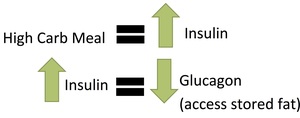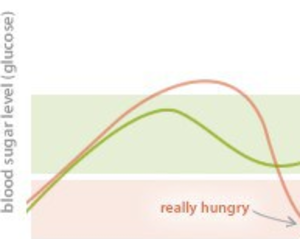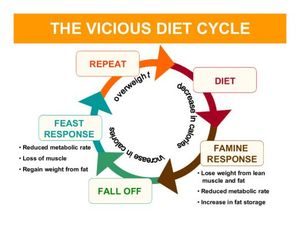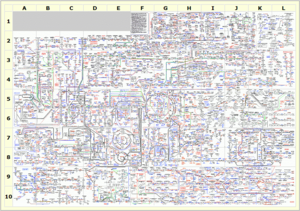Ask the food giants and they'll tell you weight maintenance is all about calories in and calories out (CICO). Mainly, so they can keep selling you their packaged garbage full of sugar and soybean oil, but also because that places the responsibility on YOU, not them!
"If you had properly managed your caloric intake and output, you wouldn't have a weight issue." -- Some Big Sugar Executive
Sadly, there's also a good chunk of health, nutrition, and fitness professionals that believe this too. Which I still don't fully understand... other than perhaps they have the same motivation?
Repeat business?
Because if they spent any time reading outside of their government-approved formal education, they'd understand pretty quickly that all calories are not created equal. It's the composition of those calories that determines whether we burn and lose, or store and gain.
And more importantly, WHAT we burn and lose, and how this effects our ability to burn and lose (or store and gain) in the future.
1. Food Has a Thermic Effect
If a calorie was a calorie we'd see protein, fat, and carbohydrates burning an equal amount of energy. But we don't. This is because of something called "the thermic effect of food" (TEF), or the number of calories we burn after we consume a certain food.
Since protein has a greater TEF than fat and carbohydrates, those eating more protein at a meal burn extra calories after eating it.
For example, if Jeff eats approximately 2,500 calories per day and 1,000 of those calories are protein, he will burn 50-150 more calories per day than if only 500 were protein.
2. Hormones Control Storage and Burning
When we consume a meal with a higher glycemic load our blood sugar rises. Forcing our pancreas to secrete insulin, so we can shuttle this energy into our cells.
If we've recently exercised, or we haven't consumed many carbohydrates that day, there's a good chance that it will get stored as muscle or liver glycogen. But, if we haven't, or perhaps our cells have become insulin resistant, it will get stored as fat.
What's worse, is that insulin signals to our body that we're in an energy surplus. Prompting our cells to hang onto previously stored energy, and inhibiting the fat releasing hormone, glucagon.
Aside from carbohydrate avoidance, glucagon is stimulated after a meal high in animal protein. Meaning regardless of caloric quantity, individuals eating a steak will stay in "burning" mode, while individuals eating a loaf of bread will move to "storage" mode.
3. Composition Controls Intake
Some foods fill us up for hours, and other foods leave us looking for lunch at 10 a.m. Generally speaking, this has to do with the speed of digestion, the glucose response, and the amount of fat and fiber.
To put it simply, a meal high in protein and fat will digest slowly and have minimal impact on your blood sugar. While a meal high in carbohydrates will digest quickly, skyrocket your insulin levels, and have you reaching for the closest candy bar.
Unfortunately, it doesn't stop there for the morning muffins and breakfast bagels, as wheat and sugar have addictive properties that make us want more. Not only quickly increasing cravings, but making us eat A LOT more than we want or should.
"Intense sweetness can surpass cocaine reward, even in drug-sensitized and addicted individuals." -- PLoS One, 2007
Conversely, if you swap those calories for animal protein, you'll eat A LOT less; subconsciously restricting intake without feeling like you're restricting anything.
4. Muscle Increases Energy Expenditure
The more muscle you have the more energy you burn at rest. So individuals that eat food (or exercise) to build muscle are increasing their daily caloric burn. Compared to individuals who limit calorically dense food (animal protein) and take part in muscle burning exercises (cardio) to reach a deficit.
A 2010 study in the Journal of the American Medical Association compared 3 diets with equal calories, but varying amounts of protein (5 percent, 15 percent, or 25 percent). The normal and high protein groups gained muscle mass (6 and 7.5 pounds) and saw an 11 percent increase in their resting metabolic rate. While the low protein group lost muscle (1.5 pounds) and saw a 2 percent reduction.
What's sad, is that individuals in a chronic caloric deficit are given the short-term satisfaction that they're losing "weight." Even though they're likely osing muscle and slowing their metabolic rate; making them quickly regain and struggle to lose in the future.
5. Deficits Decrease Energy Expenditure
Sure, there's the muscle loss and metabolic rate slowing from eating minimal amounts of food and doing excess amounts of exercise, but a chronic caloric deficit can also reduce thyroid hormone and catelochamines (1, 2).
Essentially, the body goes into starvation mode to protect itself from a future energy shortage -- storing everything it can, and trying to burn next to nothing (even during exercise). Not only making us refatten with minimal input, but making life absolutely miserable in the process. Having to battle everything from extreme hunger and less satisfaction from meals, to chronic fatigue and compromised reproductive health.
"The over 80 percent recidivism rate to pre-weight loss levels of body fatness after otherwise successful weight loss is due to the coordinate actions of metabolic, behavioral, neuroendocrine, and autonomic responses designed to maintain body energy stores." -- International Journal of Obesity, 2010
Stop Counting and Stop Struggling
- What kind of weight is it?
- How are you feeling and performing?
- Can you maintain it?
- 200 kcal of an avocado is the same as 200kcal of chocolate cake?
- Fat Fred and Slim Steve will have a similar reaction to a plate of pasta?
"Saying that these individuals lose weight because they expend more calories than they consume is like saying that students are late for class because they arrive after the bell rings. Both statements are true, but neither is causal. The associations do not explain the why." -- Dinicolantonio & Lucan, 2014
For those that are unfortunately working with a Jillian Michaels-type trainer, nutritionist, or doctor, try sending them this picture (the metabolic pathways of a cell), and asking them how a calorie goes in one end, and comes out the other side... unscathed.
Because weight loss is that simple. Right?
Stay Lean!
Coach Mike




